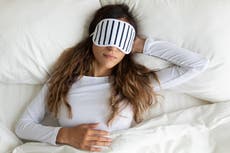The Independent's journalism is supported by our readers. When you purchase through links on our site, we may earn commission.
World Sleep Day: The benefits of sleeping on your side
Side sleeping is considered one of the healthiest sleep positions, but which side is better?

World Sleep Day is today, an annual event dedicated to promoting quality sleep worldwide and raising awareness about the best ways to get a good night’s sleep. While it may be surprising, there are sleeping positions that are considered better for your health. Side sleeping is preferred by more than half of adults, but depending on which side you choose, you can reduce snoring, heartburn, and back pain.
Side sleeping is considered the healthiest and one of the most popular sleep positions, as opposed to on your back or stomach, according to the Sleep Foundation, while a 2018 study found more than 60 per cent of adults sleep on their side.
When positioned correctly, side sleeping can reduce lower-back pain. The Mayo Clinic suggests drawing your legs up slightly toward your chest while laying on your side, and putting a pillow between your legs.
Snoring has a number of causes, and may be a sign of sleep apnea. When sleeping on your back, partial blockages anywhere between the tip of the nose to the vocal cords can create a vibration in the airways, resulting in loud noises. Side sleeping, specifically on the left side, opens your airways to help you breathe easier.
Improved gut health is another benefit to side sleeping, as the position helps your digestive system function better. People who experience heartburn or acid reflux may feel more relief when sleeping on their side. Although, studies show that sleeping on your right side can make symptoms worse. Instead, opt for the left side to ease the heartburn.
Sleeping on your side can even improve brain health and can reduce the risk of Alzheimer’s, Parkinson’s, and other brain-based diseases. Like other parts of our body, our brains are removing waste throughout the day, the majority of which takes place while we sleep. The buildup of brain waste chemicals may contribute to the development of Alzheimer’s disease and other neurological conditions. Researchers found that sleeping sideways more effectively removed brain waste than sleeping on one’s back or stomach.
So, which side should you sleep on then? It depends on the health issues preventing you from getting a good night’s sleep. The left side is thought to improve overall health more than the right side, especially for those who experience heartburn or snoring.
However, research has shown that people with congestive heart failure naturally avoid sleeping on their left side due to discomfort. On World Sleep Day, it’s important to not just catch up on much needed sleep, but make sure that we get a healthier one too.
Join our commenting forum
Join thought-provoking conversations, follow other Independent readers and see their replies
Comments


Bookmark popover
Removed from bookmarks